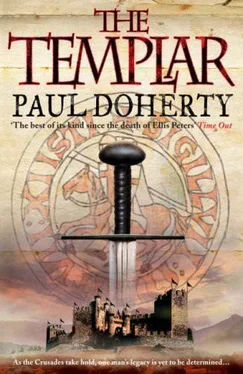P. Doherty - The Templar
Здесь есть возможность читать онлайн «P. Doherty - The Templar» весь текст электронной книги совершенно бесплатно (целиком полную версию без сокращений). В некоторых случаях можно слушать аудио, скачать через торрент в формате fb2 и присутствует краткое содержание. Год выпуска: 2010, ISBN: 2010, Издательство: Minotaur Books, Жанр: Исторические приключения, на английском языке. Описание произведения, (предисловие) а так же отзывы посетителей доступны на портале библиотеки ЛибКат.
- Название:The Templar
- Автор:
- Издательство:Minotaur Books
- Жанр:
- Год:2010
- ISBN:9780312576837
- Рейтинг книги:5 / 5. Голосов: 1
-
Избранное:Добавить в избранное
- Отзывы:
-
Ваша оценка:
- 100
- 1
- 2
- 3
- 4
- 5
The Templar: краткое содержание, описание и аннотация
Предлагаем к чтению аннотацию, описание, краткое содержание или предисловие (зависит от того, что написал сам автор книги «The Templar»). Если вы не нашли необходимую информацию о книге — напишите в комментариях, мы постараемся отыскать её.
The Templar — читать онлайн бесплатно полную книгу (весь текст) целиком
Ниже представлен текст книги, разбитый по страницам. Система сохранения места последней прочитанной страницы, позволяет с удобством читать онлайн бесплатно книгу «The Templar», без необходимости каждый раз заново искать на чём Вы остановились. Поставьте закладку, и сможете в любой момент перейти на страницу, на которой закончили чтение.
Интервал:
Закладка:
Eleanor could do nothing but shelter in her shabby tent, tongue swollen, lips cracked. Simeon relayed gossip about the growing desperation amongst the Army of God whilst continuing to insist that Eleanor write it all down in her chronicle. She was too exhausted to do anything but sprawl on her makeshift bed, one arm across her face, staring up at the stained goatskin covering. A hundred thousand had left the Frankish west; fewer than twenty thousand had reached this hideous plain before the grim, embattled walls of Jerusalem. Eleanor idly wondered about their first casualty, Robert the Reeve — what had truly happened there? And the Magus and the Fedawi? Had they all been swept away by the anger of God; were they, the remnant, to starve in full view of the Holy City or be crushed against its walls and massacred by the great host coming out of Egypt?
‘Great news.’ Theodore, covered in a fine sandy dust, wafting away the flies hovering in a black mass round his face, strode into the tent. He squatted down by the bed and grinned at her. Eleanor smiled back. Theodore, with his handsome face and persistent good humour whatever adversity threatened! Yet he’d also given Eleanor new fears, fresh terrors. She felt deeply for him and became highly anxious about news of any affray, ambush or sally. Would Theodore be hurt or, God forbid, even killed? And when those formidable city walls were stormed, would he survive the violent blood-letting? She often prayed that if Theodore were to die, she would die with him.
‘Good news,’ he repeated.
Eleanor apologised and drew herself up. Theodore cocked his head at the shouting and cheering that rang through the camp.
‘That’s the good news,’ he declared. ‘Twenty Genoese galleys put in at the ruined port of Jaffa and begged the Army of God for help. Of course our leaders were delighted. The fleet would provide a good supply of timber, perhaps more food and water. Two companies of knights and bowmen were dispatched down to the coast under Raymond Pilet. Enemy cavalry attacked them. Pilet and his men broke through and reached the ruined walls of Jaffa with enemy shields and cloaks draped over their saddles. The Genoese sailors greeted our men joyfully. They had been cruising up and down the coast for days, searching for any trace of the Army of God. Raymond told them about our hardships and the sailors immediately prepared a feast of bread, wine and cooked fish. Franks and Genoese sat down together to celebrate in the roofless hall of Jaffa Castle, lit by fires, candles and lantern horns. Platters were filled and emptied, goblets of wine passed round. They even brought in the watch from the ships to have their share of the feast.’ Theodore shrugged. ‘They celebrated too well. An Egyptian fleet far out at sea glimpsed the lights of their party and stole in to block the harbour mouth. When dawn broke, the Genoese hastened to their ships but found it futile to offer battle; all they could do was abandon their galleys and carry ashore a good part of their weapons and supplies. So that,’ Theodore gestured with his head, ‘is the good news. The Genoese have just entered the camp.’
At first Eleanor failed to see how it was good news. Matters continued to deteriorate. Each day when the sun rose the heat struck her tent, rousing her from a sweaty sleep after an uneasy night. Sharp winds gusted through the ravines and valleys, blowing clouds of dust from the deep hollows of the surrounding desert. Water continued to be scarce. Skins of foul water, brought in on camels, sold for high prices, whilst she and others had little release from the harsh grind of each day. Eyes were dust-reddened and throats silted, whilst the stench of dead animals hung heavy over the camp. Reports flowed in how the herds of livestock taken up into the hills were being attacked by Turks, who also hampered any efforts to find water. Men began to desert. They reached the river Jordan, bathed in it and gathered some reeds as a sign that they had completed their pilgrimage, yet where could they go? Turks roamed the countryside, and the port of Jaffa was firmly in their hands.
In the end Theodore’s assurances proved right. By the end of June the first timbers came down from the hills, dragged or wheeled on carts by mules and camels or carried on the backs of men. Godfrey of Bouillon marshalled the Genoese to help cut timbers and plait ropes for the catapults, keeping them busy with the mallets, spikes, nails and axes they’d brought from their ships. Godfrey’s engineer, Gaston de Béarn, was placed in overall command of the workmen, whilst the Genoese craftsman William Embriaco was assigned to Count Raymond of Toulouse. Everyone was given a task. Eleanor carried wood and prepared ropes. An array of dreadful siege weapons rose up in the camp like hideous creatures from the underworld. A massive battering ram with an iron head shielded by a wattle roof; huge catapults with twisting ropes and deep cups; numerous scaling ladders and a range of portable wattle screens behind which soldiers could approach the walls. Count Raymond moved his companies to the south opposite Sion Gate, and concentrated on filling the moat, announcing that if anyone brought three stones to cast into it they’d be given a penny. After three days and nights, a section of the moat was filled. More mantlets were organised. Each knight was to furnish two such screens and one ladder. The stone-throwers, powered by twisted ropes, were placed on wheels so they could be moved from point to point. Sows, or long sheds open at each end, were constructed so they could be pushed up to the wall to shield the sappers trying to break through.
The common consensus, however, was that the walls would have to be stormed rather than mined. The Franks placed their main hope in two fearsome siege towers built upon wheeled platforms that could be brought up against the walls. Each tower had three storeys. On the lowest were the men who pushed the tower forward; the middle storey, about as high as the level of the ramparts of Jerusalem, was for the armoured knights to cross to the wall; whilst on the upper level archers would cover the rush of the knights.
The defenders of Jerusalem watched intently and prepared their defences. They brought mangonels on to the walls to be in close firing range. They also took careful measures to protect those sections of the wall they thought would be threatened from bombardment by hanging over sacks of straw and ship ropes, thick and closely woven, to cushion the stone against attacks from the Frankish catapults. The Army of God, now fully intent on the capture of the city, demonstrated that no mercy would be shown. During one of their forays they captured a leading Muslim commander, treated him honourably but asked him to convert. When he refused, they took him out in front of the Tower of David, where he was decapitated by one of Godfrey’s knights. A few days later the Franks caught a spy coming up out of Egypt. They decided that if he wanted to enter the city then he should. Still alive, he was fastened to a catapult. He was too heavily weighted down and was not hurled far, but fell on sharp stones near the wall and broke his neck instantly.
The mood in the Frankish camp changed imperceptibly. The machines were ready, the formidable towers rising up; food and water was organised. Hopes rose, only to be dashed when Hugh and Godefroi brought news that the leaders were beginning to quarrel amongst themselves again. Objections had been raised against Tancred for hoisting his standard above Bethlehem, whilst the leaders were also debating about what was to be done when Jerusalem was taken. The clergy became involved, pointing out that Jerusalem was the Holy City and should have no king but Christ. Other titles were put forward: governor or regent. Hugh and Godefroi listened and took council with their own company. It was time for another vision. Peter Desiderius came forward. In a dream, he proclaimed before the council, his words spreading quickly through the camp, the saintly Adhémar of Le Puy had visited him and warned him that the Lord was not pleased. The army needed to purify itself. They must confess their sins, purge their guilt and bring themselves to a state of unity and grace before the assault was launched. Once again this vision was accepted. The common people thronged around the tents and pavilions of their leaders, urging that this be so. An order went out. On 8 July 1099, priests and monks armed with crosses and the relics of saints would lead a procession of knights and every able-bodied man and woman before the walls of Jerusalem. Trumpets would be blown, standards brandished. Eleanor, Theodore and the rest marched with the Frankish host as it processed barefoot, singing hymns and raising crosses around the city. From the battlements the defenders mocked them, loosing stones and arrows, but the procession was completed. A fast was ordered and everyone went to a priest to have their sins shriven; even the great leaders clasped hands and swore eternal amity.
Читать дальшеИнтервал:
Закладка:
Похожие книги на «The Templar»
Представляем Вашему вниманию похожие книги на «The Templar» списком для выбора. Мы отобрали схожую по названию и смыслу литературу в надежде предоставить читателям больше вариантов отыскать новые, интересные, ещё непрочитанные произведения.
Обсуждение, отзывы о книге «The Templar» и просто собственные мнения читателей. Оставьте ваши комментарии, напишите, что Вы думаете о произведении, его смысле или главных героях. Укажите что конкретно понравилось, а что нет, и почему Вы так считаете.












